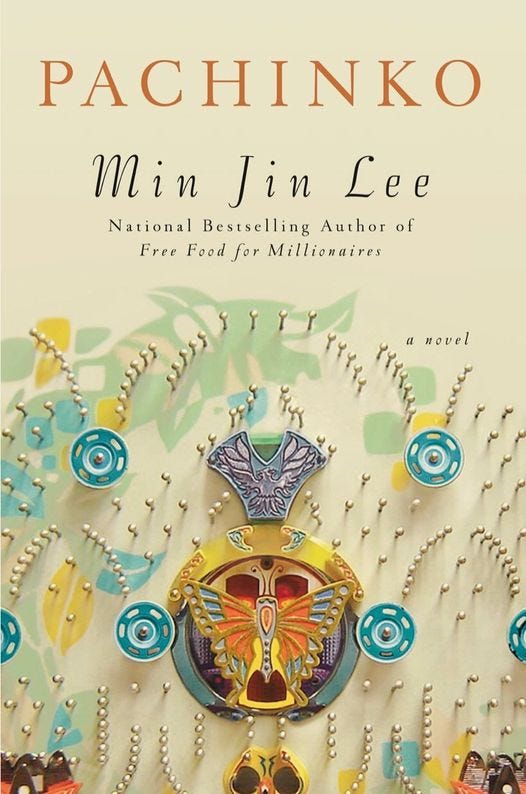Review- "Pachinko" (book version)
First part of a comparative review between the book and TV series "Pachinko"

Hello again! Thanks for joining this new entry of The Virtual Typewriter.
For the last part of December and the first week of January I got hooked by “Pachinko”, a book published by Min Jin Lee that later got adapted into a streaming series on Apple TV+ by Soo Hugh. Pachinko follows the story of a Korean immigrant family across four generations, as they leave their homeland to survive and thrive across the 20th century. The storytelling is so rich, emotional and captivating I knew I had to make a big publication consisting of a comparative review between both works.
The review will be divided into a 2-part series: one for the book and one for the TV show. This piece is about the book, and coming soon I’ll share my thoughts about the series and which one of the works I liked more.
WARNING: I will try to avoid as many spoilers as possible, but they could make small appearances, so proceed with caution.
Book Review
The book was released in 2017, and it’s divided into three mini books (Gohyang/Hometown, Motherland and Pachinko) that covers around 79 years of history.
At first glance it may seem like an extremely dense book when you take into consideration the themes it tackles and its length. Indeed, it’s not a light book you read in a day (for me it took a week), but the reading experience was better than I anticipated. Each chapter is no longer than 20 pages, the writing itself is very easy to understand, when it uses Korean or Japanese words and phrases a lot of times the narration quickly explains what it means for non-speakers, and the predominant themes (colonialism, racism, sexism, beliefs, culture, identity, among others) are written with plenty of research, honesty, and care.
My favorite part is that the book’s timeline is more chronological than the show. Of course, there’s a couple of times that it uses flashbacks before resuming present events, but generally it’s more linear, which helped me a lot to remember what era I was witnessing while reading.
It’s also more detailed with the ages of the characters (there’s recurrent sentences where it mentions “this character is now “x” years old) that makes the reader feel that time is passing by, which I feel the show kind of struggled with (since there’s few actors’ changes for each character)
Something I appreciated a lot is that it cleared a lot of questions quicker than the series. In the screen adaptation there’s a lot of mystery with the fate and whereabouts of many characters, that at the time I’m making this post they’re still ambiguous while season 2 arrives. Thankfully the book gives a sense of closure to this group of people (either with calm or shocking moments), and they’re narrated so wonderfully I ended up very grateful this work exists.
What are my thoughts about the TV adaptation? Who wins in the “book vs. show” debate? Stick around to find out in my next post here at The Virtual Typewriter!
P.S: if you want to check out the book you can get more information here



